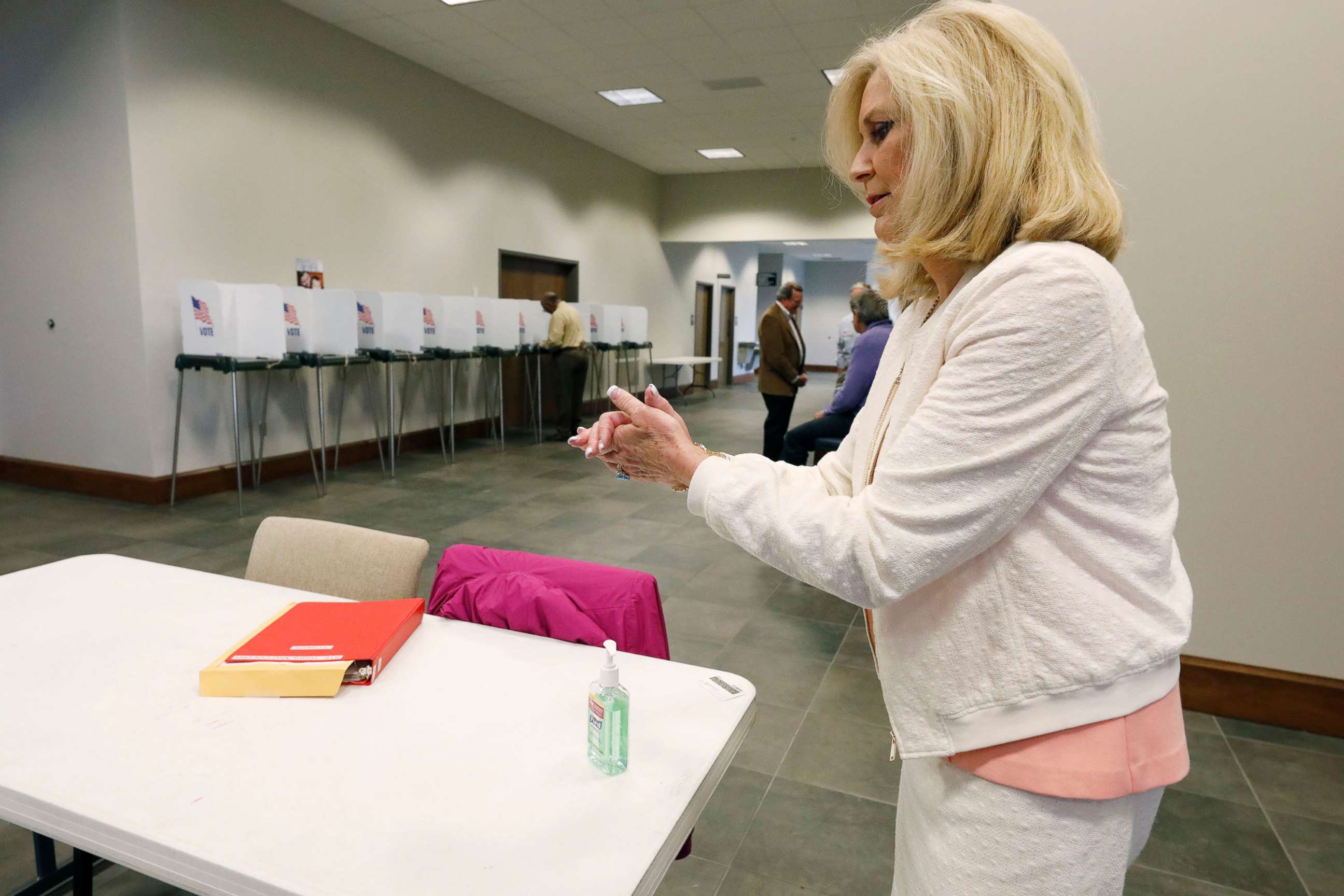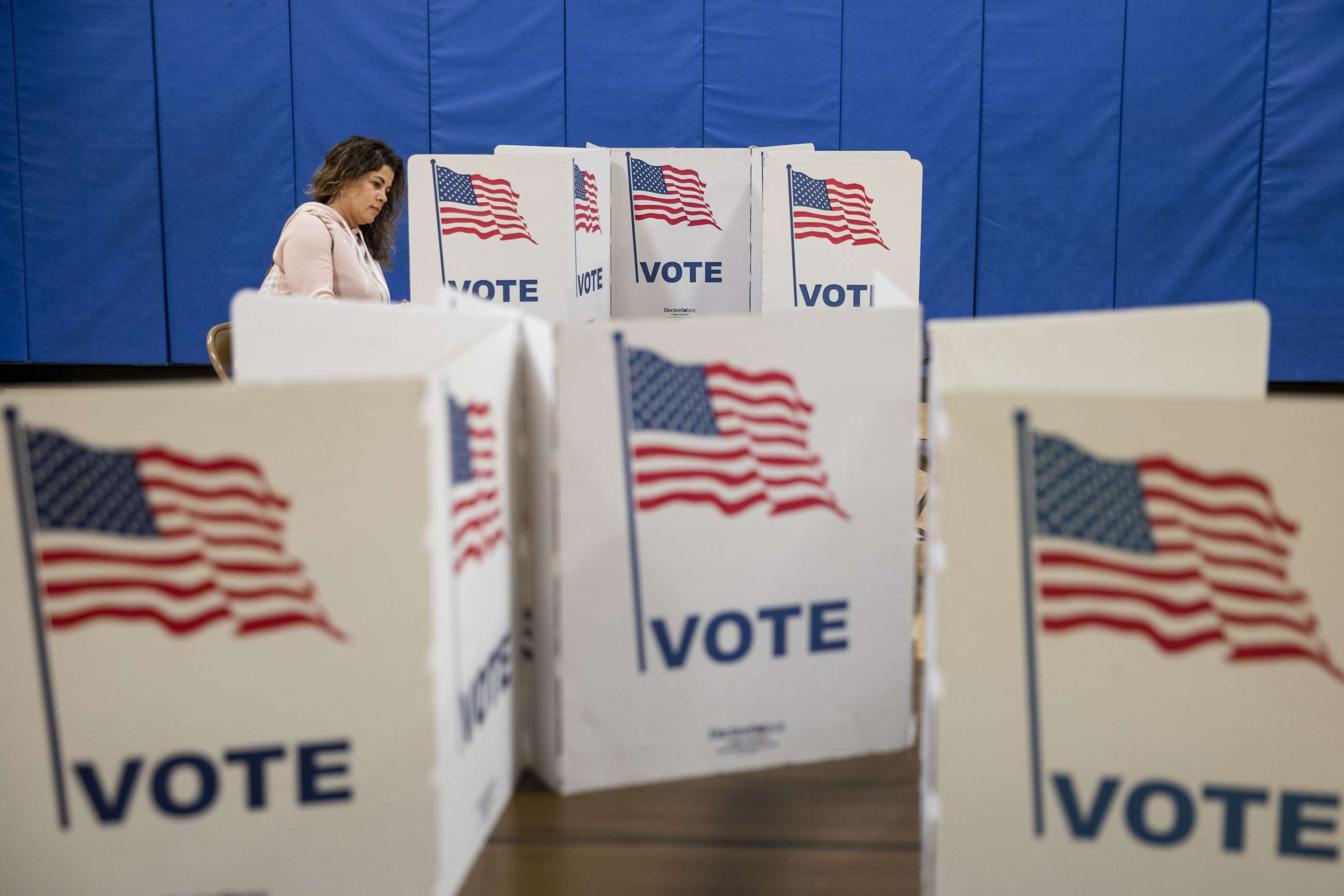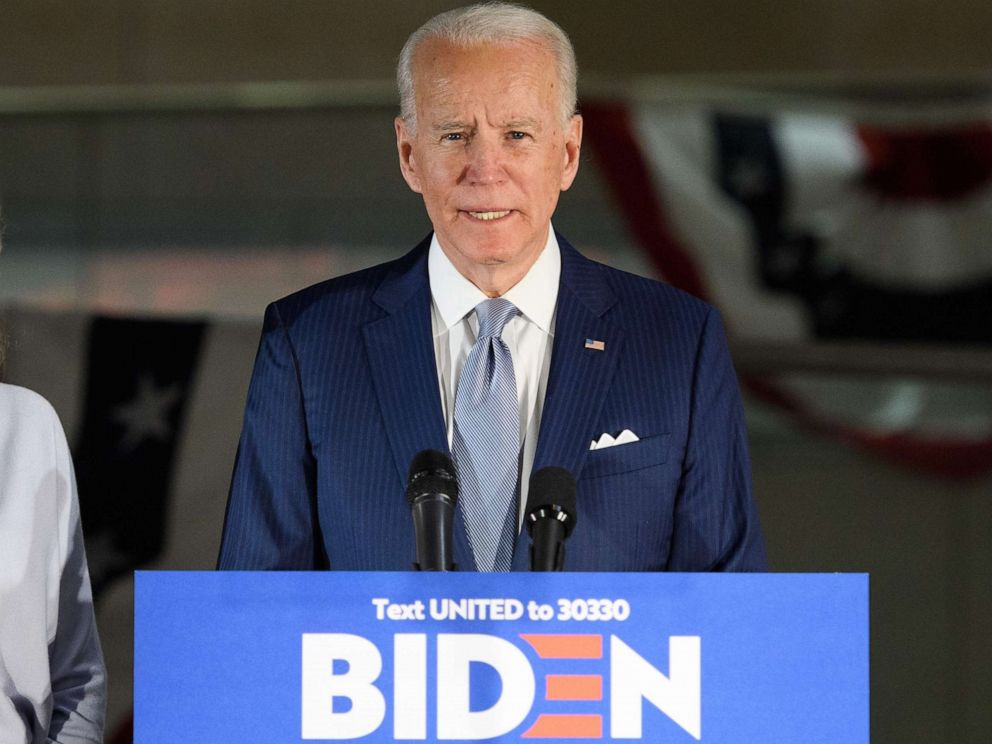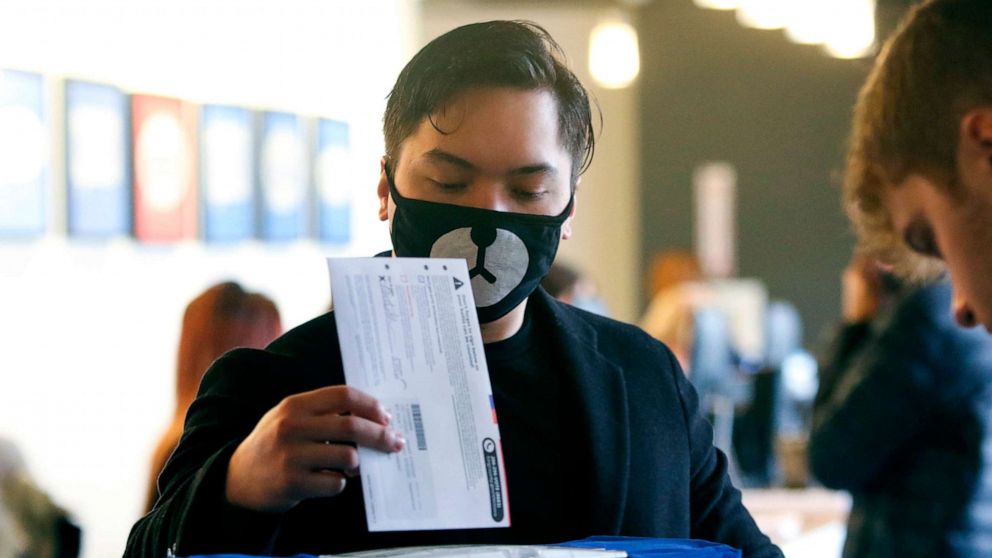Coronavirus and the 2020 campaigns: Some states delay primaries; caution urged in canvassing
As the 2020 election cycle presses on in the midst of a global coronavirus pandemic, states continue to seek to postpone primaries to promote social distancing, candidates virtually campaign and promote teleworking and both parties strategize how how to best and most tactfully criticize opponents' covid-19 responses.
Here's how the day in politics unfolded.
Arizona, Florida, Illinois set to vote Tuesday
Arizona, Florida and Illinois are all set to vote Tuesday in a primary that is historic due to the spread of the coronavirus.
Voting is moving forward in Arizona, though local election officials have moved dozens of polling locations away from vulnerable communities and encouraged more people to vote early and drop off absentee ballots.
Illinois has seen record levels of early voting ahead of this election, and absentee voting is also very high, which has contributed to minimal concerns about large crowds at the polling sites tomorrow.

Florida election officials are forging ahead with primary day where there are at least 155 confirmed COVID-19 cases in Florida, according to Johns Hopkins University.
County election officials told ABC News Monday that among the key concerns weighing over Tuesday’s primary are:
Adhering to the CDC’s latest guidelines for large gatherings in polling sites
Taking precautions at polling locations
Poll worker shortages
Voter confusion after poll closures and changes
Florida prepares for voting as coronavirus threatens to upend 2020 race
Florida, the most delegate-rich state set to vote on Tuesday, is forging ahead with primary day amid growing anxieties over the novel coronavirus.
"Florida is proceeding with tomorrow's scheduled election...Voters in Florida can safely and securely go to the polls and cast their ballots in tomorrow's election," Florida Secretary of State Laurel Lee said at a press conference on Monday, standing alongside Gov. Ron DeSantis. "Precinct-based voting, where voters go to the polls and cast a ballot, is unlike the gatherings our health professionals have advised Floridians to avoid. It is quick. It is community-based."
In a state with at least 155 confirmed cases of COVID-19, chief election officials have sought to assuage fears over voting potentially risking exposure to the virus in the days leading up to the nominating contest.
But some county election officials raised concerns as the outbreak upends Tuesday’s primary, leaving them worried about adhering to the CDC’s latest guidelines for large gatherings in polling sites, taking the necessary precautions to protect voters, poll workers and volunteers, poll worker shortages, and voter confusion over poll closures and changes.
"I don't know how you would stop an election that's three-quarters through," a state Democratic Party official told ABC News. "We're living in kind of weird times and a lot of this is unprecedented.
In Palm Beach County, which sits on the southeastern shoreline just north of Miami and where nearly one-quarter of the population is over 65 years old, polling places will be limited to no more than 50 people inside, according to Link. The line deputy, whose job it is to monitor crowd control and the line, will be monitoring the flow of voters in and out of the precinct, she added.
In neighboring Broward County, which is the most prevalent county for COVID-19 infections, Steve Vancore, the spokesperson for the Broward County Board of Elections, told ABC News that it would be "relatively rare" to have more than 50 voters at a polling place at the same time, before adding, that "obviously, if it's getting crowded in there, [officials will] ask people to wait outside."
Another key hurdle facing officials on the eve of the primary is that poll workers, rattled by the rapidly spreading disease, calling to say they won’t show up Tuesday, as polling locations are being relocated to avoid spreading the coronavirus to at-risk populations, with a number are doing so in the last few days, cutting it very close to Election Day and leaving little time to notify voters of the changes.
"We have received assurance that poll workers who are otherwise healthy can safely work on election day," the secretary of state said on Monday, hoping to reassure an unnerved public.
Ohio governor announces poll closures despite judge denying request to postpone primary
Ohio Gov. Mike DeWine tweeted late Monday night that polls would be closed as a matter of a public health emergency as the state seeks to further press its legal case in court to extend primary voting to June 2.
"During this time when we face an unprecedented public health crisis, to conduct an election tomorrow would force poll workers and voters to place themselves at an unacceptable health risk of contracting coronavirus, " DeWine tweeted.. "As such, @DrAmyActon will order the polls closed as a health emergency. While the polls will be closed tomorrow, Secretary of State @FrankLaRose will seek a remedy through the courts to extend voting options so that every voter who wants to vote will be granted that opportunity."
As such, @DrAmyActon will order the polls closed as a health emergency. While the polls will be closed tomorrow, Secretary of State @FrankLaRose will seek a remedy through the courts to extend voting options so that every voter who wants to vote will be granted that opportunity.
— Governor Mike DeWine (@GovMikeDeWine) March 17, 2020
Just a few hours earlier, a Franklin County, Ohio judge denied the state's request to postpone until June 2 its primary voting originally slated for Tuesday.
The moves come as the Centers for Disease Control issued new recommendations that gatherings do not exceed 50 people and that everyone practice 'social distancing,' and remain six feet apart.
Read more here.
Kentucky becomes third state to postpone presidential primary; other states seek the same
Kentucky plans to postpone its presidential primary from May 19 to June 23, marking the third state to delay a nominating contest in the last week over concerns of coronavirus.
Democratic Gov. Andy Beshear, after receiving a recommendation from the state's Republican Secretary of State Michael Adams, announced today, "We are postponing our primary elections by the 35 days allowed under state law. That means they will be moved to June 23. Again, a necessary step. We don't want people out there trying to create gatherings."
Adams, who joined Beshear at a press conference Monday, said the decision will "buy us time" as the state officials work to stem the spread of the outbreak.

"It buys us time," Adams said. "Obviously the hope is that by June 23, the worst will be over and we'll be able to have an election that's as normal as possible. The other possibility is that we won't be back to normal. This will give us time to assess changes that we can make in our election system as to location, potentially even as to method, to make sure that we can have a smooth election."
Beshear signed an executive order today after receiving Adams' recommendation, a spokesperson for Beshear told ABC News.
Kentucky now joins Georgia and Louisiana, two states that moved their primaries late last week. Georgia moved from March 24 to May 19, the same day that Kentucky's primary was originally supposed to be held and Louisiana moved its April 4 primary to June 20.
But now with another primary set for after the Democratic National Committee's June 9 deadline for all contests to be held by, Kentucky's Democratic Party will have to work with the national committee to get a special waiver approved, allowing for the later primary date. The DNC's Rules and Bylaws Committee will have to approve the waiver.
ABC News reached out to the DNC for a response.
Rhode Island Secretary of State Nellie Gorbea on Monday asked the state's Board of Elections to move to a predominately mail ballot primary ahead of the April 28 contest date.
Gorbea says "supporting a predominately mail ballot election minimizes contact between individuals" which would address concerns about the spread of CoVid-19, "while also ensuring that all eligible Rhode Islanders have the opportunity to vote...".
Rhode Island is one of six, east coast states voting in the "Acela primary" six weeks from now, and on Tuesday, the Rhode Island Board of Elections will review options for holding its election amid public health concerns, including Gorbea's proposal.
Meanwhile, the Puerto Rico Senate has passed the resolution to change the date of the Democratic presidential primary from March 29 to April 26, with the added provision that the chairman of the Democratic Party of Puerto Rico (DPPR) and the president of the State Commission on Elections to postpone it further if necessary.
"The amendment to the Presidential Primary Act is a necessary step to preserve public health in the face of the global pandemic. Postponing the primary will also ensure a larger turnout for many Puerto Ricans to express their support for a permanent union with the U.S. and the need for the territory to assert itself, with real decision-making power, as part of the democratic processes of the nation”, said Charles Rodriguez, DPPR chairman.
On the state government level, Texas. Gov. Greg Abbott pushed the special election for State Senate District 14 to July 14, 2020. The special election was originally due to be held on May 2.
Joe Biden projected to win Washington primary
Former Vice President Joe Biden is projected to win the Washington primary, clinching his fifth state (out of six) from the March 10th contests, according to Edison, which collects data for several networks, including ABC News.
Biden only lost North Dakota to Bernie Sanders on that primary night.

Washington was the second most delegate-rich state of the night, behind Michigan, with 89 delegates, and so far, Biden and Sanders are estimated to pick up 34 each.
Political campaigns redirect efforts to coronavirus response
While the coronavirus outbreak has frozen political campaigning at every level -- stopping local petitioning and primary campaigns, and postponing a growing number of presidential primaries - some candidates are repurposing their efforts to help combat the spread of the virus and its impact on their communities.
Rep. Joe Kennedy, D-Massachusetts, who is running in the Democratic primary to unseat Sen. Ed Markey, D-Massachusetts, said he's using his campaign email list to raise money for groups in Massachusetts and around the country that are providing relief for groups helping the most in need - including United Way and several local food banks.
Trump campaign staff told to work from home until end of March
President Trump’s campaign told staff to work from home until the end of March, a senior campaign official told ABC News.
All campaign staff had been working from home since last Friday but were set to return tomorrow after a deep cleaning of the Washington D.C. arena offices over the weekend.
The news comes after the the White House advised Americans not to gather in groups of more than 10.
In a memo to Republican House members, Rep. Tom Emmer of Minnesota, the chairman of the National Republican Congressional Committee, House R's campaign arm, urged GOP members not to fundraise off of coronavirus.
Republicans are pointing to the ads from House Democrats which .
Emmer is also asking Republicans to be careful in how they message during the crisis, and take steps to mitigate the risks for campaign staff and volunteers.
ABC News' Meg Cunningham, Kendall Karson, Quinn Scanlan, Benjamin Siegel, Will Steakin and Alisa Wiersema contributed to this report.




